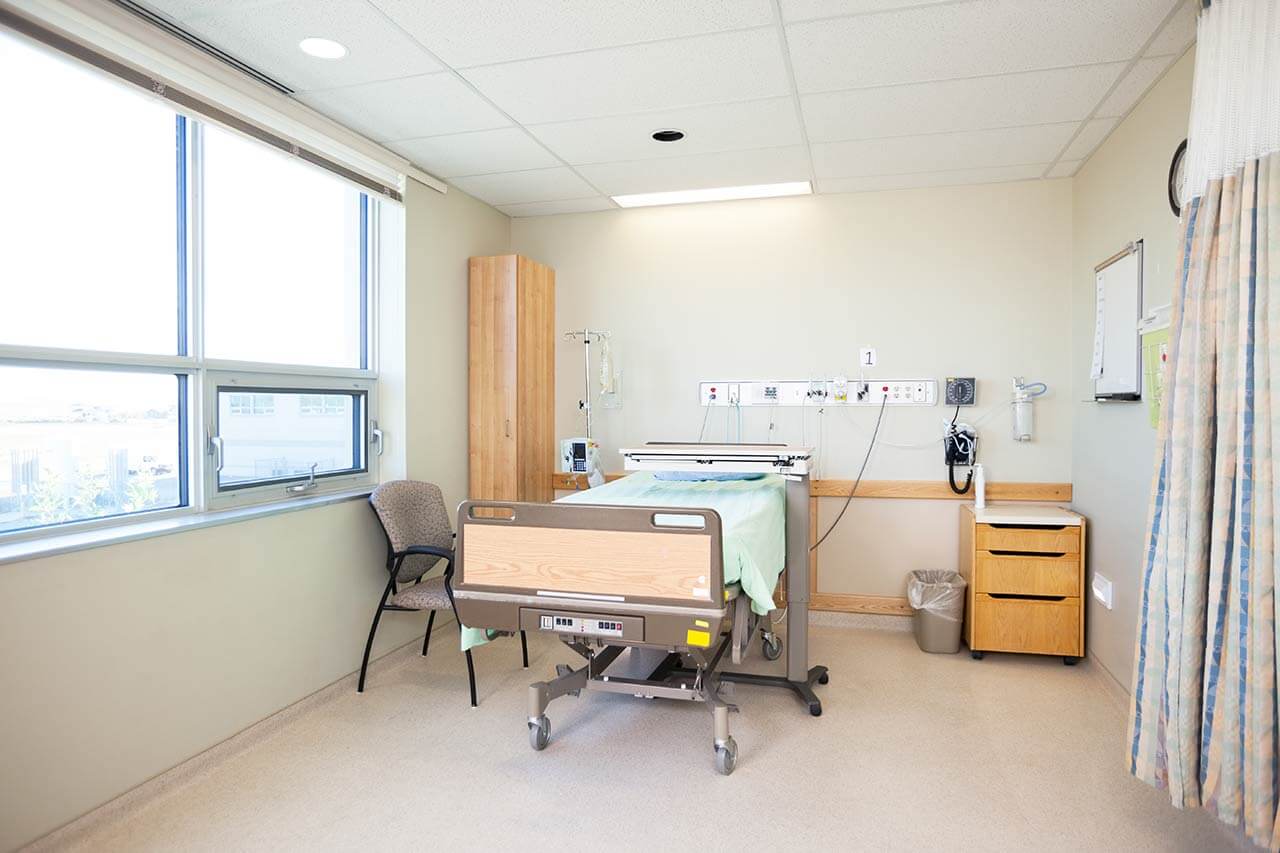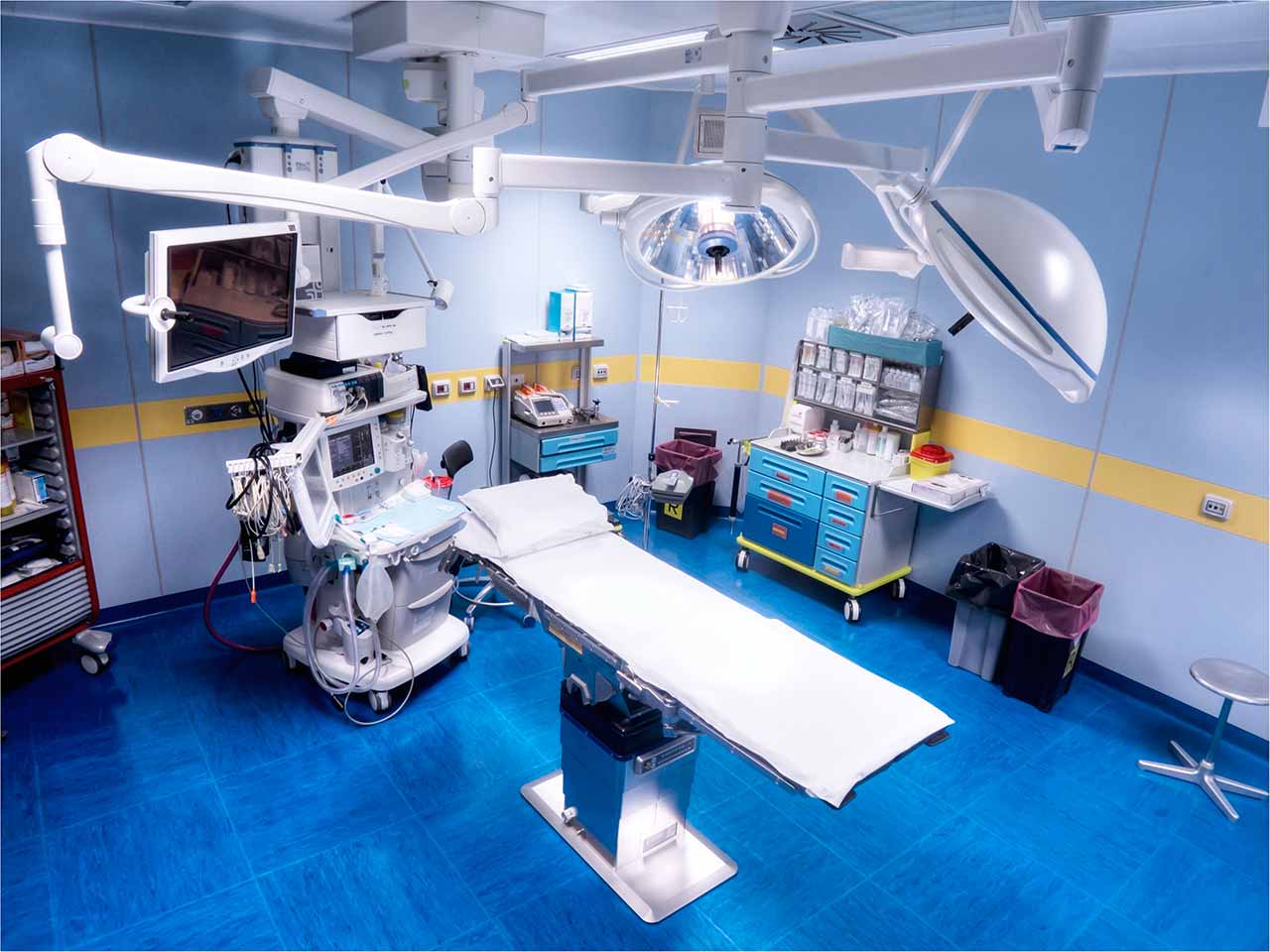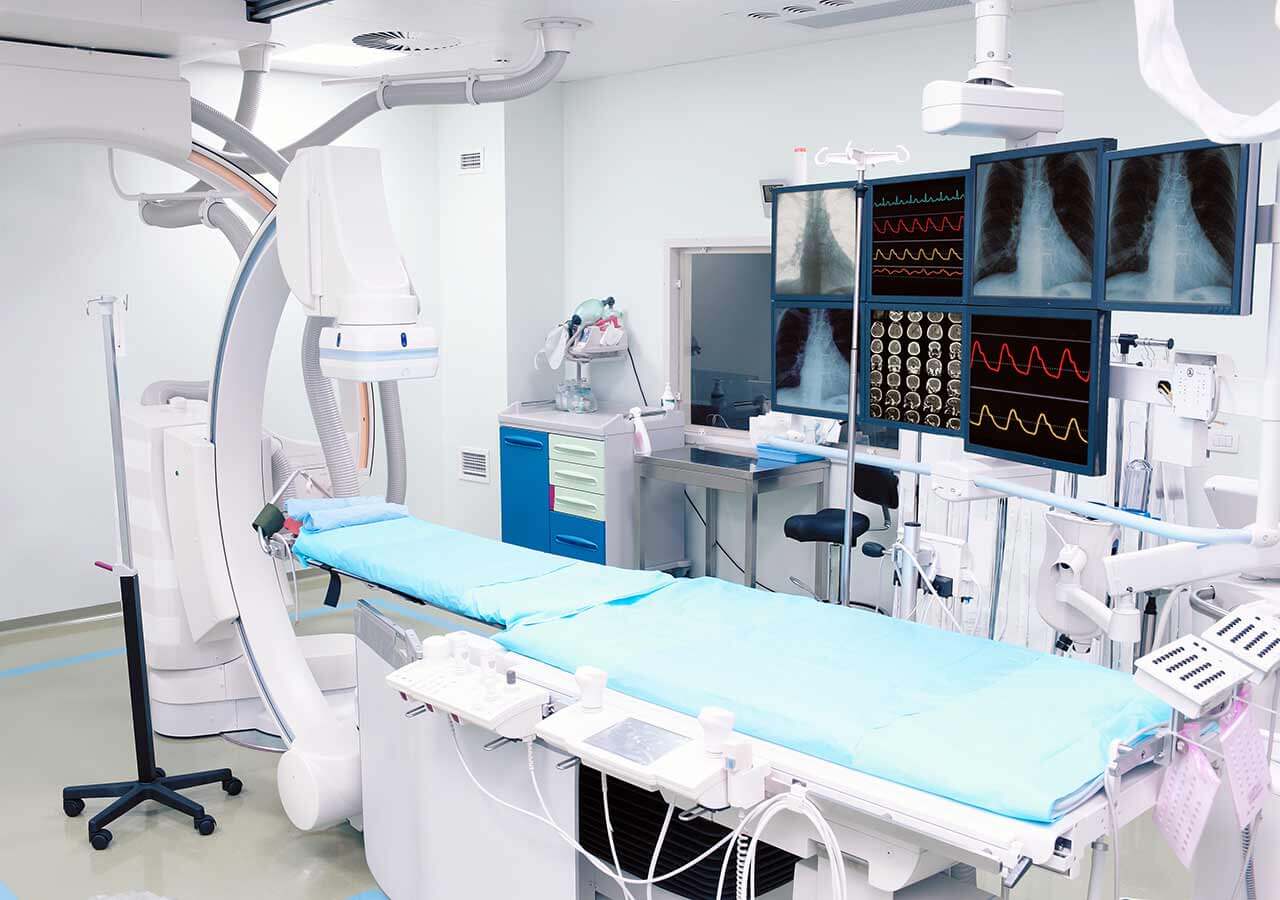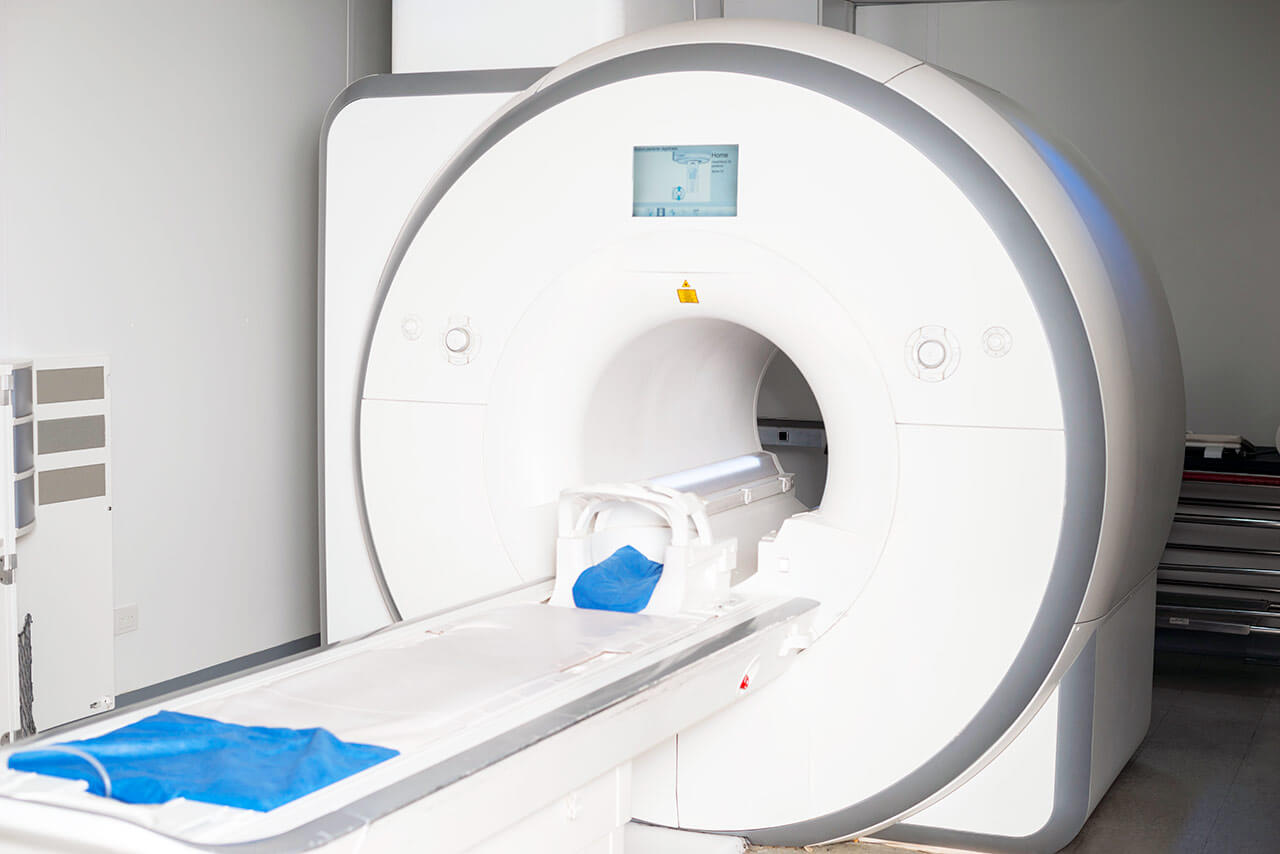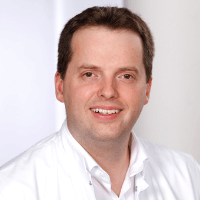
The program includes:
- Initial presentation in the clinic
- case history collection
- general clinical examination
- laboratory tests:
- complete blood count
- general urine analysis
- biochemical analysis of blood
- TSH-basal, fT3, fT4
- tumor markers
- indicators of inflammation
- indicators blood coagulation
- CT/MRI scanners
- pelvic ultrasound
- gynecological examination
- transvaginal ultrasound
- colposcopy
- preoperative care
- hysterectomy, salpingo-oophorectomy, lymphadenectomy
hyperthermia (cytostatic rinsing with heating to 42°C) - biopsy with histological examination of the material
- symptomatic treatment
- cost of essential medicines
- nursing services
- stay in the hospital with full board
- full hospital accommodation
- elaboration further recommendations
Required documents
- Medical records
- MRI/CT scan (not older than 3 months)
- Biopsy results (if available)
Service
You may also book:
 BookingHealth Price from:
BookingHealth Price from:
About the department
The Department of Gynecology and Obstetrics at the St. Anna Hospital Herne provides the full range of diagnostic and therapeutic services for women with diseases of the reproductive system. The department's competence also includes comprehensive management of pregnancy, childbirth and postpartum care. The department most often provides treatment to patients with endometriosis, uterine fibroids, ovarian cysts and other benign neoplasms, as well as urinary incontinence. A special focus is made on the treatment of the female reproductive cancers: uterine and cervical cancers, ovarian, fallopian tube, vaginal and vulvar cancers. The department's specialists carry out conservative and surgical treatment of gynecologic diseases. Gynecologists widely use laparoscopic and endoscopic surgical techniques, and also use transvaginal access. Open surgery is performed only in complex clinical cases, usually for oncology. The department is headed by Prof. Dr. med. Sven Schiermeier.
More and more patients come to the department with suspected cancer of the reproductive system: cervical, endometrial, ovarian, vaginal and vulvar cancers. Such women undergo comprehensive diagnostics, including laboratory tests and instrumental tests. Thus, doctors receive comprehensive information about the type of tumor, the stage of cancer, the presence or absence of metastases, which determines the tactics of further treatment. In most cases, the first-line therapy is surgical resection of the malignant tumor, while the advanced stages of oncology require the removal of the affected organ with adjacent lymph nodes. However, cancer cannot be cured using only surgery. The specialists of the medical facility also use additional conservative methods: chemotherapy, radiation therapy, chemoradiotherapy, hormone therapy, etc. A particular treatment regimen is developed at the interdisciplinary tumor board with the participation of gynecologists, oncologists, radiologists, radiation therapists and other doctors. An integral part of the therapeutic process is work with a psychologist.
The department's medical team successfully copes with the treatment of benign gynecologic diseases. Endometriosis, adenomyosis, uterine fibroids and ovarian cysts are treated here. At the early stages of endometriosis, drug therapy is used, and in more serious cases, the patient requires a laparoscopic intervention to remove the pathological foci. The department uses many modern treatment methods: taking a complex of medications, endoscopic enucleation of uterine myomas and various types of hysterectomy (TLH, LASH, LAVH, VH). When an ovarian cyst is detected in a woman, follow-up monitoring in dynamics is often sufficient; if the pathology does not progress, then there is no need for specific treatment. However, many cases still require therapy – minimally invasive intervention, endometrial ablation, and so on.
Another focus of the department's work is the treatment of various forms of urinary incontinence and pelvic organ prolapse. In case of urinary incontinence, the specialists of the medical facility primarily consider conservative treatment methods, including electrical stimulation, biofeedback, special therapeutic exercises, and pessary therapy. In advanced cases, surgery is the best treatment option. The department's gynecologists perform modern sling procedures (TVT and TVT-O) and Burch colposuspension. Conservative and surgical treatment methods are also used for pelvic organ prolapse elimination. The surgical intervention is the last-line therapy and is prescribed to a woman only if other therapeutic procedures are ineffective.
Obstetrics provides all services for monitoring the course of pregnancy, planning and childbirth, as well as postnatal care for the mother and her newborn baby. Childbirth takes place in three well-equipped and comfortable delivery rooms. If desired, water childbirth is possible. With appropriate clinical indications, obstetricians perform a C-section. During natural childbirth, doctors use various techniques to relieve pain. These include homeopathy, acupuncture, epidural anesthesia and other procedures. The department's doctors make every effort to ensure the most safe and comfortable childbirth, since the birth of a child is the most joyful event in the life of every woman.
The department's range of medical services includes:
- Gynecology
- Diagnostics and treatment of malignant gynecologic diseases
- Endometrial cancer
- Uterine cancer
- Cervical cancer
- Ovarian cancer
- Vulvar cancer
- Fallopian tube cancer
- Surgery
- Chemotherapy
- Radiation therapy
- Chemoradiotherapy
- Hormone therapy
- Diagnostics and treatment of benign gynecologic diseases
- Endometriosis
- Drug therapy
- Laparoscopic interventions
- Adenomyosis
- Drug therapy
- Minimally invasive interventions
- Uterine fibroids
- Drug therapy
- Endoscopic enucleation
- Hysterectomy (TLH, LASH, LAVH, VH)
- Ovarian cysts
- Laparoscopic interventions
- Hysteroscopy
- Ablation
- Endometriosis
- Diagnostics and treatment of urogynecologic diseases
- Urinary incontinence
- Conservative therapy: electrical stimulation, biofeedback, special therapeutic exercises, pessary therapy
- Surgical treatment: sling procedures (TVT and TVT-O) and Burch colposuspension
- Pelvic organ prolapse
- Conservative therapy: special physiotherapy, pessary therapy
- Surgical treatment: plastic surgery of the anterior and posterior walls of the vagina, vaginal cuff fixation, Amreich-Richter vaginal fixation, laparoscopic colposacropexy
- Urinary incontinence
- Diagnostics and treatment of malignant gynecologic diseases
- Obstetrics
- Comprehensive pregnancy management
- Birth planning and management, including water births and C-sections
- Postnatal care for the mother and her newborn baby
- Other therapeutic options
Curriculum vitae
Prof. Dr. med. Sven Schiermeier heads the Department of Gynecology and Obstetrics at the St. Anna Hospital Herne. The specialist received his specialized education at the Faculty of Medicine of the Ruhr University Bochum, where he also defended his thesis and had habilitation. The doctor's internship, highly specialized training and further clinical activities took place in the hospitals of Witten. In addition to his clinical activities, Prof. Sven Schiermeier works as a lecturer at Witten/Herdecke University and participates in the development of special forms of examinations for medical students aimed at assessing the theoretical knowledge and practical skills of future doctors. In addition, the professor explores new ways to monitor the heart function of children in the womb. Of particular interest to him is sparing minimally invasive interventions for uterine fibroids and some types of female reproductive cancers. As a Member of the Guideline Committee of the German Society for Obstetrics and Gynecology, the doctor helps determine standard cardiotocography (CTG) procedures during pregnancy.
Photo of the doctor: (c) St. Anna Hospital Herne
About hospital
According to the famous Focus magazine, the St. Anna Hospital Herne ranks among the best medical facilities in North Rhine-Westphalia!
The hospital first opened its doors to patients on September 27, 1901, and therefore it is rightfully proud of its long history and successful treatment results. Initially, the hospital had only 40 beds, and today it offers 380 beds for the accommodation of inpatients. The patients benefit from perfectly equipped diagnostic rooms, operating rooms and treatment rooms, in which therapeutic procedures and surgical interventions of any severity are performed.
The hospital has over 1,400 employees. The doctors of the medical facility annually admit about 32,100 inpatients, and more than 56,300 outpatients receive high-quality medical care. The specialists provide services to patients from their region and other federal states of Germany, as well as to patients from other countries of the world. The medical team of the hospital strives to provide each patient with optimal treatment in the most comfortable conditions and in a friendly environment.
The hospital specializes in the following medical fields: orthopedics and traumatology, general and abdominal surgery, internal medicine, gastroenterology, oncology, gynecology, obstetrics and mammology. Each of the medical directions is represented by a specially trained team of doctors who possess deep knowledge and rich clinical experience in their area of specialization. It should be noted that the Department of Orthopedics and Traumatology is one of the largest and best in the whole of Germany. Other departments of the hospital also demonstrate excellent results, which are confirmed by various quality certificates, including certificates of the German Cancer Society, the German Hernia Society, and the German Spine Society.
Photo: (с) depositphotos
Accommodation in hospital
Patients rooms
The patients of the St. Anna Hospital Herne are offered accommodation in single rooms and rooms designed for several people. All rooms are bright, have a modern design and all the necessary amenities. The furnishings of the standard patient room include an automatically adjustable bed, a bedside table with a locker, a wardrobe, a table and chairs, a TV, and a telephone. Each patient room has an ensuite bathroom with shower and toilet.
Patients can also choose to stay in enhanced comfort rooms. These rooms provide patients with a comfortable bed, a refrigerator, a safe and a TV with a DVD player. If desired, one can also connect to Wi-Fi. The patient can also independently adjust the brightness of the lighting in the patient room. In addition, the enhanced comfort room has a glazed balcony with a seating area.
Meals and Menus
The patients of the hospital are offered tasty and healthy three meals a day. The patients have a choice of buffet meals for breakfast and dinner, and there is a choice of several set menus for lunch. Patients are offered tea, coffee, mineral water and juices at any time.
If for some reason you do not eat all foods, you will be offered an individual menu. Please inform the medical staff about your food preferences prior to treatment.
Further details
Standard rooms include:
Television
You can listen to 4 radio programs and watch 30 television programs through the headphones at the patient's bed.
Religion
Religious services are available upon request.
Accompanying person
Your accompanying person may stay with you in your patient room or at the hotel of your choice during the inpatient program.
Hotel
You may stay at the hotel of your choice during the outpatient program. Our managers will support you for selecting the best option.
